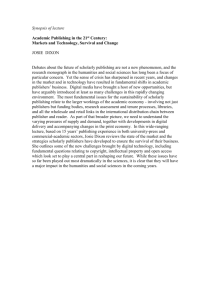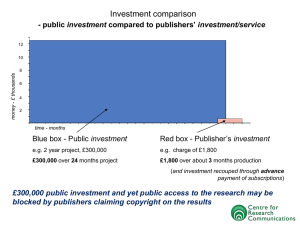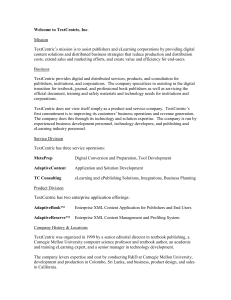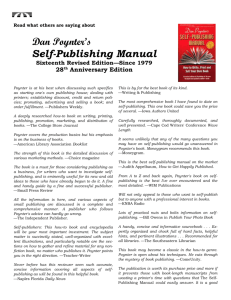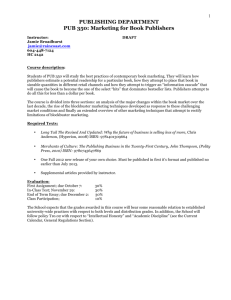Self-Publishing Company.
advertisement
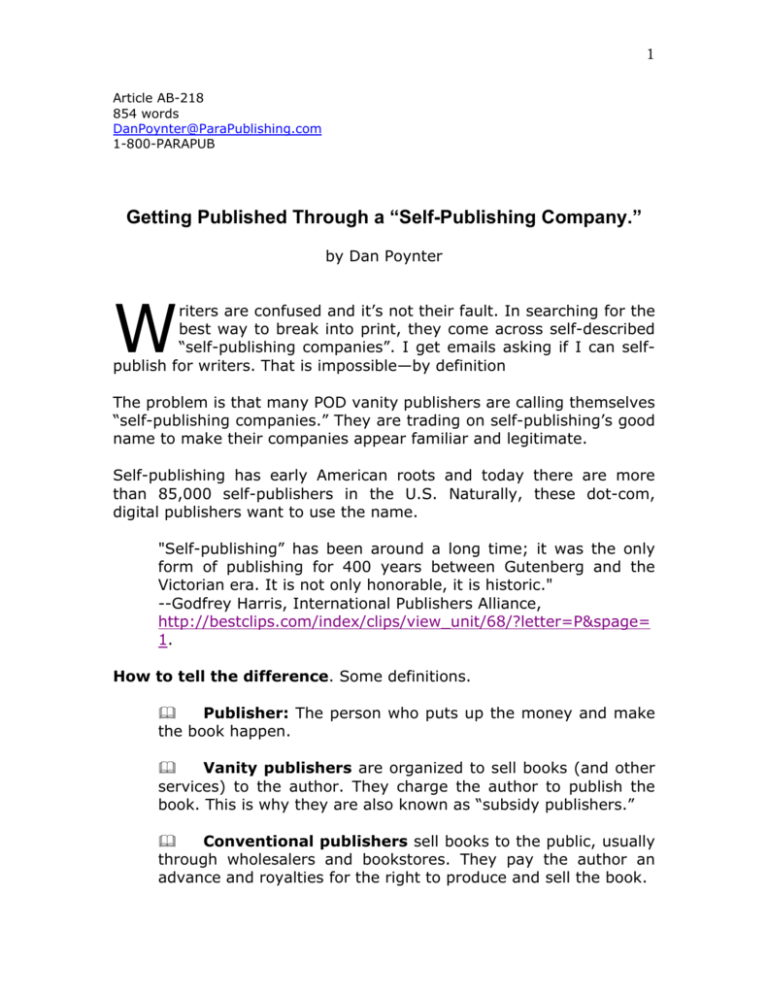
1 Article AB-218 854 words DanPoynter@ParaPublishing.com 1-800-PARAPUB Getting Published Through a “Self-Publishing Company.” by Dan Poynter W riters are confused and it’s not their fault. In searching for the best way to break into print, they come across self-described “self-publishing companies”. I get emails asking if I can selfpublish for writers. That is impossible—by definition The problem is that many POD vanity publishers are calling themselves “self-publishing companies.” They are trading on self-publishing’s good name to make their companies appear familiar and legitimate. Self-publishing has early American roots and today there are more than 85,000 self-publishers in the U.S. Naturally, these dot-com, digital publishers want to use the name. "Self-publishing” has been around a long time; it was the only form of publishing for 400 years between Gutenberg and the Victorian era. It is not only honorable, it is historic." --Godfrey Harris, International Publishers Alliance, http://bestclips.com/index/clips/view_unit/68/?letter=P&spage= 1. How to tell the difference. Some definitions. Publisher: The person who puts up the money and make the book happen. Vanity publishers are organized to sell books (and other services) to the author. They charge the author to publish the book. This is why they are also known as “subsidy publishers.” Conventional publishers sell books to the public, usually through wholesalers and bookstores. They pay the author an advance and royalties for the right to produce and sell the book. 2 Would you write a book knowing that you would be the only purchaser? How to spot scam vanity publishers. A literary attorney advises other lawyers. see http://www.wisbar.org/AM/Template.cfm?Section=Wisconsin_Lawyer& template=/CM/ContentDisplay.cfm&contentid=68934 According to Wikipedia, Self-Publishing is the publishing of books and other media by the authors of those works, rather than by established, third-party publishers.The only “self-publishing company” is you—by definition. If you pay a publisher, your book is not SELF-published. Self-publishers, write, publish and promote their own books. We have been building name recognition for self-publishing for more than 35 years. Self-publishing garners respect. Traditionally, when a book publishing CEO wrote a memoir, he or she would seek another publisher to release it so that the book would not appear to be a vanity work. Times have changed. Self-publishing has become so recognized and legitimate that the vanity stigma from publishing your own Work has nearly disappeared. Now that people know what self-publishing is, we find we have to reeducate the public to the fact that we are the real self-publishers and the other DotCom POD digital publishers are really just vanity publishers masquerading as us. They are trading on the good reputation we have built. On the other hand, there are many digital printing companies. Most provide excellent prices, service and quality. They should refer to themselves as “book printers.” For information on the choices for breaking into print, get the f-r-e-e Information Kit #2 on Publishing at http://parapublishing.com/sites/para/resources/infokit.cfm Many of the DotCom vanity publishers help people to produce their books for a few hundred dollars. The low cost of entry attracts literary talent from the bottom of the barrel. With so little to invest, most of 3 these authors don’t verify their research and don’t invest in editors, typesetters, book designers or cover artists. Both authors and publishers of these poor-quality vanity-published books give all book publishing a bad name. These POD vanity publishers are leaving a trial of unhappy customers. See the list of unresolved complaints to the Better Business Bureau. http://poddymouth.wordpress.com/2008/01/18/self-publishing-podindustry-reputations/ Should you self-publish? For a self-paced quiz, see http://www.happilypublished.com/self.html. Does self-publishing work? It worked for John Grisham, Richard Nixon and Stephen King. See Document 155 at http://parapub.com/sites/para/resources/allprod ucts.cfm and see http://parapub.com/sites/para/resources/success _list.cfm Self-Publishing and the Long Tail. See http://www.bob-baker.com/qt/abundance.html Due diligence. Writing a book is a creative act; publishing a book is a business. Before trying anything new, people should get educated. “Buying a few books and attending some seminars are cheaper than a mistake.” -- Mindy Bingham, publisher, Academic Innovations, Santa Barbara. Anyone who's been in publishing for a while can share a number of stories of people who stumbled and blundered into the book game without getting sufficient information first. These pioneers have made just about every mistake imaginable. Profit from their (temporary) failures: don’t repeat their painful lessons. “It's unfortunate when someone makes a mistake but it's unforgivable when an error is made a second time.” -- Dan Poynter Remember that in any new field, especially book writing and publishing, others have blazed the trail for you. 4 The book industry is full of helpful and supportive people. It may be unexpected because this kind of camaraderie does not exist in other industries. The reason that book people are so helpful, friendly and supportive is that every book is unique. There is little to no competition in book publishing. When it comes to marketing books, we are conspirators not competitors. Let’s respect historical and common definitions. We can protect the newcomers to book publishing by helping them to understand the difference between conventional publishers, self-publishers, book printers and the vanity/subsidy publishers. ~~~~~~~~~~~~~~~~~~~~~~~~~~~~~~~~~~~~~~~~~ Dan Poynter, author of The Self-Publishing Manual, is the “Godfather” to thousands of books. He has written more than 100 books since 1969. Dan is a past vice-president of the Publishers Marketing Association. For more information on book publishing and promoting, see http://ParaPub.com. © 2008 -30-

